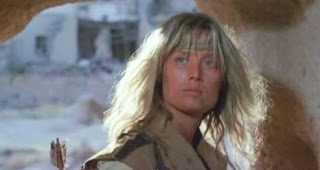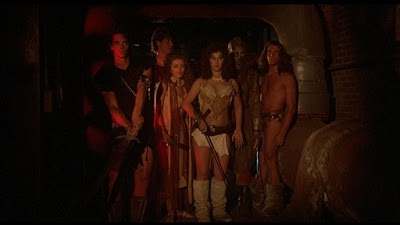SERENITY
(US/UK - 2019)
Written and directed by Steven Knight. Cast: Matthew McConaughey, Anne Hathaway, Jason Clarke, Diane Lane, Djimon Hounsou, Jeremy Strong, Rafael Sayegh, David Butler, Charlotte Butler, Garion Dowds. (R, 106 mins).
Steven Knight got an Oscar nomination for scripting 2003's DIRTY PRETTY THINGS, and his many other writing credits include the 2007 David Cronenberg film EASTERN PROMISES. He also earned significant acclaim for 2014's LOCKE, which he also directed. In addition, he's the co-creator of WHO WANTS TO BE A MILLIONAIRE? and the creator of the Netflix series PEAKY BLINDERS. He's done hired gun writing gigs on commercial fare like 2015's SEVENTH SON, 2016's ALLIED, and 2018's THE GIRL IN THE SPIDER'S WEB, but SERENITY, his latest auteur effort, is the kind of shit-the-bed clusterfuck that can completely derail an otherwise successful career. Just ask Martin Brest, the director of BEVERLY HILLS COP and MIDNIGHT RUN whose final film to date is GIGLI. Shot in 2017, SERENITY's release date was bumped a couple of times in the fall of 2018 until upstart Aviron Pictures yanked it from the schedule and saved it for January, an almost certain indicator that something was amiss. Trailers made it look like a BODY HEAT-type noir throwback, which unquestionably would've been preferable to the bait-and-switch that Knight haplessly tries to pull off. The end result feels like an homage to the heyday of the erotic thriller borne of a doomed alliance between James M. Cain, Joe Eszterhas, M. Night Shyamalan, Charlie Brooker, and Jack Daniels, populated by an overqualified cast clearly more intrigued by a paid vacation to scenic Mauritius and South Africa than containing whatever the dumpster fire was that Knight cobbled together on the page.
On Plymouth Island, a tiny, off-the-grid fishing island presumably somewhere in the Caribbean, local fisherman Baker Dill (Matthew McConaughey) is obsessed with catching a legendary giant tuna that he's named "Justice." When he isn't on his boat with his long-suffering first mate Duke (Djimon Hounsou), he's downing shots at Plymouth's one dive bar and having sweaty afternoon hookups with wealthy divorcee Constance (Diane Lane), who pays him for his services since he's perpetually short on cash. Plymouth is the kind of place where everyone knows everyone's business, and it isn't long before they've all noticed a well-dressed mystery woman who's arrived to meet Baker. She's Karen Zariakis (Anne Hathaway), his high-school sweetheart and ex-wife who knew "Baker Dill" when he went by his real name, John Marsh. She left him when he was serving in Iraq a decade earlier, taking their now-13-year-old son Patrick (Rafael Sayegh) with her. She married the shady and obscenely wealthy Frank Zariakis (Jason Clarke), a violent, vulgar lout who regularly beats and forces himself on her and demands she call him "Daddy." Haunted by PTSD and still bitter that gold-digging Karen abandoned him when he needed her most, Baker, who was so desperate to run from something in his past that he fled to an island in the middle of nowhere and adopted an alias, isn't interested in his ex's sob stories and wants no part of her very lucrative offer: $10 million if she takes Frank out on a fishing excursion and throws him into the shark-infested waters. He declines--for a while, at least-- even after she informs him that Franks's abuse is so relentless that Patrick, a savant-like genius, has locked himself in his room and spends all of his waking hours immersed in a computer game.
In any other movie, the notion of Diane Lane playing a woman who has to pay a man to sleep with her would easily be the most absurdly implausible plot detail. Or that McConaughey (born in 1969) and Hathaway (born in 1982) are supposed to be high-school sweethearts. But Knight is just getting started. What's with the weird, eccentric, persistent salesman (Jeremy Strong) who keeps anxiously running around Plymouth looking for Baker, even turning up outside his shack at 2:30 am in a torrential downpour to sell him fishing equipment? How does Baker have a telepathic communication with Patrick ("He hears you through his computer!" Karen tells him)? How does everyone know Frank is a wife-beater before he even gets to Plymouth? Why is everyone's chief reason for being seemingly to remind Baker "You gotta catch that tuna that's in your head?" You could actually make a drinking game out of every time someone says "Catch that tuna!" which actually might've made a better title than SERENITY (it's the name of Baker's boat). Hathaway makes a convincingly breathless, cooing femme fatale, even with the insipid dialogue Knight's written for her ("We're both the same," she purrs as she seduces Baker, "...damaged but in different ways," as if Knight doesn't trust the audience to draw the same conclusion). All of this is merely foreplay for what's almost certain to go down as the dumbest plot twist of 2019 or possibly even the history of narrative cinema. It might've worked if Knight hadn't telegraphed it so clumsily so early on, but anyone paying attention will figure it out long before Baker does, even if you initially dismiss your gut feeling, thinking "There's absolutely no fucking way an Oscar-nominated writer like Steven Knight is gonna pull something that stupid out of his ass." Oh, but he does! With its gaping plot holes, its jaw-dropping resolution guaranteed to leave you somewhere between thoroughly dumbfounded and utterly enraged, its idiotic dialogue, its squandering of Lane in a frivolous supporting role that's far beneath her, and the ludicrous amounts of self-indulgent McConaughey nudity and his third-act, Nic Cage-channeling histrionics, SERENITY is so bad that it almost demands to be seen with a large and increasingly hostile audience collectively losing its patience. I didn't get to experience that, as I had the entire theater to myself for a Monday matinee screening. Apparently, the word's gotten out.
















































































